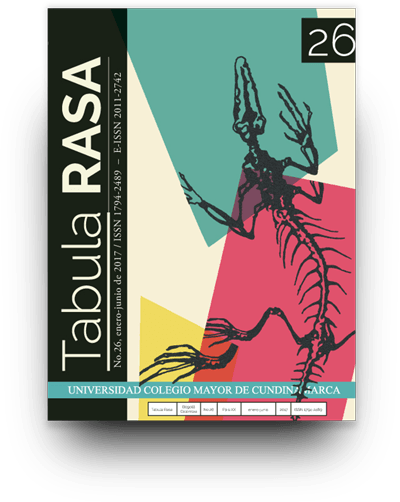Mostrar biografia dos autores
«Somos petróleo» é um experimento de prática-como-pesquisa, criado para pesquisar a forma como os americanos conceitualizam suas relações com o petróleo. Durante a performance, os participantes leram em voz alta emulações do testemunho diplomático Gwich'in sobre ser povo Caribú. Nas emulações, o texto é o mesmo, mas se diferencia porque a palavra «caribú» é substituída por «petróleo». Os Gwich'in são um povo indígena cujas terras de origem localizam-se no nordeste de Alaska e no noroeste do Canadá. Durante décadas têm impedido a exploração de gás e petróleo nos terrenos onde nascem os bezerros da manada de caribús porco-espinhos (Porcupine Caribou). O rebanho é o sustento deles e de sua identidade. O artigo ocupa-se do testemunho original Gwich'in e da performance que emula seu testemunho para promulgar as relações petróleo-humanos em termos das relações caribú-Gwich'in. O artigo e a performance usam teorias indígenas da lei e a figuração ecológica para provocar uma reflexão sobre as relações do petróleo como parentesco substantivo, estruturação da ordem legal e cosmologia.
Visualizações de artigos 108 | Visitas em PDF 46
Downloads
- Anderson, K. (2005). Tending the wild: Native American knowledge and the management of California’s natural resources. Berkeley and Los Angeles: University of California Press.
- Awiakta, M. (1993). Selu: Seeking the corn-mother’s wisdom. Golden: Fulcrum Pub.
- Banerjee, S. (2012). Arctic voices: resistance at the tipping point. New York: Seven Stories Press.
- Bass, R. (2004). Caribou Rising: Defending the Porcupine Herd, Gwich-’in Culture, and the Arctic National Wildlife Refuge (1 edition). San Francisco: Sierra Club Books.
- Benjamin, W. (1968). Illuminations (Vol. 241). New York: Schocken Books Incorporated.
- Black, C. F. (2010). The land is the source of the law: a dialogic encounter with indigenous jurisprudence (Taylor & Francis e-Library Kindle Edition). London: Routledge.
- Bridge, G., & Le Billon, P. (2013). Oil. Cambridge: John Wiley & Sons.
- Coulthard, G. S. (2014). Red Skin, White Masks: Rejecting the Colonial Politics of Recognition. Minneapolis: University Of Minnesota Press.
- Cowen, D. (2014). The Deadly Life of Logistics: Mapping Violence in Global Trade. Minneapolis: University of Minnesota Press.
- De la Cadena, M. (2015). Earth beings: Ecologies of practice across Andean worlds. Durham and London: Duke University Press.
- Deloria, V. (2006). The world we used to live in: remembering the powers of the medicine men. Golden, CO: Fulcrum Pub.
- Drum, D. (2016). We are Petroleum [Performance interactivo].
- Gertz, E. (2017). Gwich’in Gear Up to Fight for Alaska’s Arctic National Wildlife Refuge. Arctic Deeply. Retrieved from https://www.newsdeeply.com/arctic/articles/2017/06/14/gwichin-gear-up-to-fight-for-alaskas-arctic-national-wildlife-refuge
- Gwich’in Steering Committee. (2004). Protect the Sacred Place Where Life Begins. Gwich’in Steering Committee. Retrieved from http://ourarcticrefuge.org/resources/
- Gwich’in Steering Committee. (2005). A Moral Choice for the United States. Gwich’in Steering Committee. Recuperado de http://ourarcticrefuge.org/wp-content/uploads/2012/10/GSChumanrightsreport.pdf
- Hames, R. (2007). The Ecologically Noble Savage Debate. Annual Review of Anthropology, 36(1), 177–190. https://doi.org/10.1146/annurev.anthro.35.081705.123321
- Huber, M. T. (2009). The use of gasoline: Value, oil, and the “American way of life.” Antipode, 41(3), 465-486.
- Kimmerer, R. W. (2014). Braiding Sweetgrass: Indigenous Wisdom, Scientific Knowledge and the Teachings of Plants. Minneapolis, Minn: Milkweed Editions.
- Kulchyski, P. (2012). Aboriginal Rights Are Not Human Rights. Winnipeg, Manitoba: Arbeiter Ring Publishing.
- Lee, P. (1991, September 15). Some Native Peoples See Dividends, Others See Disaster in Oil Drilling. Los Angeles Times. Recuperado de http://articles.latimes.com/1991-09-15/news/mn-3692_1_native-peoples
- Miller, D. S. (2001). Arctic Refuge: A Circle of Testimony. (H. Lentfer & C. Servid, Eds.). Minneapolis, Minn: Milkweed Editions.
- Mitchell, T. (2013). Carbon Democracy: Political Power in the Age of Oil. London: Verso Books.
- ˈhazard, v. (n.d.). OED Online. Oxford University Press. Recuperado de http://www.oed.com/view/Entry/84854
- O’Malley, J. (2015, 14 de marzo). Listen to the Gwich’in | Al Jazeera America [Periodismo]. Recuperado el 3 de noviembre, 2015, de http://projects.aljazeera.com/2015/03/arctic-village/
- Povinelli, E. A. (2002). The cunning of recognition: indigenous alterities and the making of Australian multiculturalism. Durham: Duke University Press.
- Raibmon, P. (2005). Authentic Indians: Episodes of Encounter from the Late-Nineteenth-Century Northwest Coast. Durham: Duke University Press.
- Riley, S. R., & Hunter, L. (Eds.). (2009). Mapping Landscapes for Performance as Research. Basingstoke: Palgrave Macmillan. Recuperado de http://www.palgraveconnect.com/pc/doifinder/10.1057/9780230244481
- Rosaldo, R. (1989). Imperialist nostalgia. Representations, 107-122.
- Sarah J. (2000, December). An interview with Sarah James regarding the Arctic Wildlife Refuge. Recuperado de http://www.duncanentertainment.com/james.php
- Sarah J: Indigenous Peoples and Climate Change. (2009). [Video en línea]. Bioneers. Recuperado de https://vimeo.com/16666326
- Sherry, E., & Vuntut Gwitchin First Nation. (1999). The Land Still Speaks– Gwitchin Word About Life in Dempster County. Vuntut Gwitchin First Nation. Recuperado de http://www.vgfn.ca/book-order.php
- Simpson, A. (2014). Mohawk Interruptus. Durham: Duke University Press. Recuperado de http://read.dukeupress.edu/content/mohawk-interruptus
- Simpson, L. (2008). Looking after Gdoo-naaganinaa: Precolonial Nishnaabeg Diplomatic and Treaty Relationships. Wicazo Sa Review, 23(2), 29-42. https://doi.org/10.1353/wic.0.0001
- Smithers, G. D. (2015). Beyond the “Ecological Indian”: Environmental Politics and Traditional Ecological Knowledge in Modern North America. Environmental History, 20(1), 83-111. https://doi.org/10.1093/envhis/emu125
- TallBear, K. (2000). Shepard Krech’s The Ecological Indian: One Indian’s Perspective. International Institute for Indigenous Resource Management [IIIRM] Publications., 30. Recuperado de http://www.iiirm.org/review/bkreview.htm
- Watts, M.J. (2006). Empire of Oil. Monthly Review, 58/4, 1–16.




